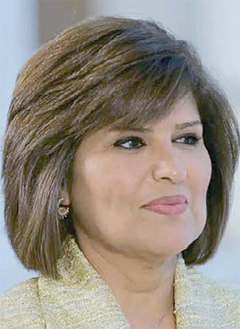 Nabila Al-Anjari
Nabila Al-AnjariKUWAIT: Leaders Group for Consulting and Development, the representative of the World Tourism Organization in Kuwait, issued its monthly report on recent developments in the tourism sector in Kuwait.
Leaders Group General Manager, Nabila Al-Anjari, said: "Factors affecting the drop in oil prices and the impact on budget surplus as well as income overall are an indicator today that Kuwait should look to generate income from other sectors to cover losses to its budget."
The report said that even though oil prices dropped, Kuwait has security and social stability and maintains a strong financial center, one of the strongest in the Gulf. This alone is an incentive to focus on the development of the tourism sector, which is one of the fastest growing sectors and would allow covering income lost from oil. The International Monetary Fund had said in a report that the drop in oil prices has made it necessary for Kuwait to diversify its economy and create jobs away from the dependence on oil and foreign workforce.
The report added that Kuwait's stability will allow it to become a tourist destination instead of other areas in the region facing turmoil. This was the case of Dubai which saw a boom in tourism despite of regional crises.
Tourism performance
Leaders Group's report called to increase efforts in the development of the tourism industry. Kuwait's tourism falls last among Gulf countries in terms of infrastructure, number of tourists and income generated from tourism, despite a government large expenditure exceeding $11 billion.
In comparison, Kuwait's gross domestic product (GDP) is second in the GCC after Qatar, reaching $173 billion annually, the equivalent of $43,250 per capita, while the UAE has a GDP per capita of only $42,940. With that said, Kuwait's tourism sector performance is moderate compared to the UAE's tourism sector. Reasons behind the slow performance in Kuwait have become well known.
Income generated from tourism in the GCC in 2013 clears the picture even more. Kuwait trails last in the list with one $369 million generated, followed by Bahrain with $1.17 billion, then Oman with $1.36 billion, Qatar with $4.6 billion, Saudi with $8.24 billion and the UAE at the top with $13.97.
Development plan
The report showed that tourism would play a significant role in the development plan of 2015-2020, particularly thanks to the current agreement between the parliament and government, and the ambitious plans to diversify the economy away from the dependence on oil.
The report also added that there are many factors that would support the local tourism sector and attracted Gulf tourists. An example is the high spending power of the Gulf tourist in comparison to the global average. This is an opportunity for Kuwait seeing unstable conditions in other parts of the tourism world such as Paris and Tunis, and the assumptions that these would spread to other cities in Europe and the US. In addition, Kuwait is one of the richest oil-producing countries, capable of enhancing its infrastructure and establishing a tourism hub worthy of world standards.
In conclusion, the report said that while Kuwait spends $11 billion on tourism, there is lack of sufficient governing bodies to manage touristic development. Spending therefore does not translate into income such as its Gulf counterparts. The need for transparency, openness and loosening regulations will attract more tourists, accompanied by a marketing campaign. Without these steps, Kuwait would miss on an opportunity to make tourism an income-generating sector in light of the drop in oil prices.










